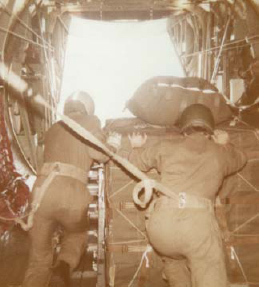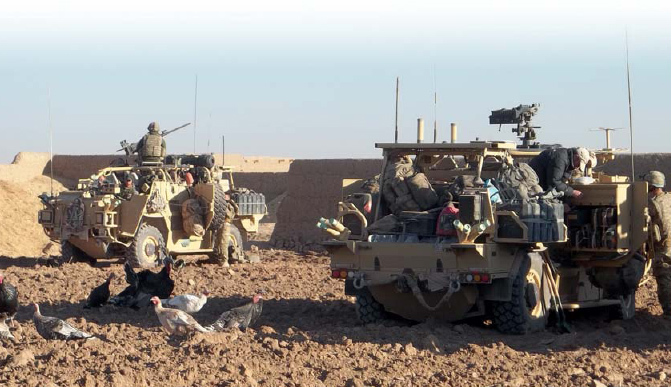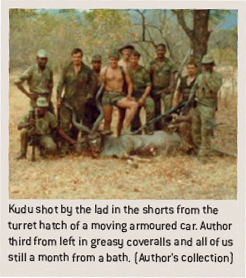On patrol
But what happens when you get out on patrol for a few days? You get to eat ration packs don’t you? Armies all over the Western World have derisory names for ration packs but the fact is they are packed full of vitamins, calories and goodness so as to keep you on your feet and maybe even smiling.
Ration packs come in two forms: a sort of bulk pack with which someone designated cook can feed a team of 10 men with and single-man packs which are issued individually. As a general rule, the packs which are meant to feed one man for one day on operations can easily be made to last two days. In the British Army these packs contain a great many tea bags – other armies have coffee too. Of course, with the packs comes loo roll, tooth powder, chewing gum and all the comforts of home.
Food intake
Food works the opposite way round to water with regard to climate: the colder it gets the more food you need. In very cold climates you need thousands of calories a day to keep your body system working properly and keep warm. In temperate climates you won’t take much hurt from not eating for four days but you might want to eat more regularly than that for comfort and to maintain your energy. Four days without food will not injure or impede you overly but after that you will begin to weaken noticeably.
Hot food
The only thing you have to do with ration packs is warm them up – if you have time. It used to be the case that you were supplied with a little solid fuel stove called a Hexamine cooker from the fuel pellet which provided the heat. You open the tin frame and take out the box of fuel pellets then place one back in the frame which forms a stand for the cooking vessel. One pellet would boil a litre of water in normal conditions though a strong breeze made them a lot less efficient.
Modern rations are even more convenient – many have self-heating packs where you just pull the strip and the pack of food warms itself for you. Wonders of science hey?
But the thing about hot drinks and hot food is that they are mainly for morale and occasionally to warm your body. The food in ration packs does not need to be heated to cook it as that has been done long ago. Why does cooking matter? Because to get the goodness out of many foods the human body needs them to be cooked as this breaks down the cells with the goodness in them. More about that in a moment. For now, be aware that all the food in your ration pack can be eaten cold if necessary and you will still get the energy from it.
Energy drinks
It was a habit of mine years ago to more or less live on black tea with lots of sugar out on 5-day patrols in Africa. Tea and sugar take no carrying and the water you need to drink anyway. It was certainly better than rancid corned beef which was the only alternative. An added bonus is that it is easy to make.
Nowadays there are energy drinks available which will give you a quick burst of energy and this can be useful in the short term. The drinks also often give you a shot of caffeine which can be a help when you are tired. I know there are arguments against the use of caffeine as a stimulant but most people will agree it is better than dozing on patrol or guard and getting the back of your head blown off.
The problem with energy drinks is that they come in cans and cans are heavy to carry about in addition to water until you want to use one. A good alternative is to buy the energy drink in dried form – or better – make one up yourself from glucose (a ‘simple sugar’ which is easy for your body to use), caffeine and flavouring. Keep it dry in a bag and add water when you need it.

Food dropped wherever you need it – tasty treats being rolled out of the back of a Hercules C-130. (Photo courtesy Sergeant Roy Mobsby)
LIVING OFF THE LAND
We all know the modern soldier is provided with all manner of tasty treats in his rations – don’t bullshit me – but if you are Special Forces then you may be away from re-supply for an extended period and find it necessary to find your own food. This is not ‘survival’ training remember, so not exactly living off nature’s bounty, but I will tell you here how to stay out on patrol longer when lack of food would otherwise force you back to base.
The first thing you need to realize is that most of what you see on TV and read in the survival books is bullshit from a soldier’s point of view. True woodsman-type survival skills take all your day, every day, to scrape a living together in the form of water and calories. This is no good to you while you are trying to fight a war. What you need is a quick supply of water – which we have seen you can get from the locals – and a handy supply of food rich in calories.
The sort of vegetable food you can find in the wild, even if you know which to eat and how to prepare it, is generally so low in calories that it is hardly worth eating. As a general rule, green plants don’t have much in the way of calories. Calories come mainly from the roots which supply the plant with the energy to grow next year – like potatoes and yams – or from the seeds such as corn and many types of nuts. As these don’t commonly grow wild you are not going to get them except from other humans.

A British Pathfinder patrol stops in a village surrounded by turkeys, Afghanistan 2010. Don’t steal the locals’ food unless you are on the run and desperate. They have little enough as it is and it will never win you any favours. (Photo courtesy Tom Blakey)
Food from the locals
Very often the locals will be pretty poor. Civilians generally are poor where a war is happening as they maybe can’t work for landmines and the insurgents probably rob them. So the chances are they will sell you food if you produce a few dollars. It is a fortune to them and nothing to you. But there are down-sides to buying your food from the locals.
If you are on a covert mission then you can be sure the locals will tell the enemy you are there. If you have to talk to the locals keep most of your men hidden so they don’t know your numbers and make sure you set up a fire position outside the village and keep your eyes open while the buyers are in there. I have been hit while doing this as it is so easy for the locals to keep you talking while they send for the enemy to come and ambush you as you leave. This way, remember, they get your dollars and a reward from the enemy for ratting on you.
Grain and fruit is pretty safe from local suppliers but make sure they don’t have time to doctor it before you make your deal. You don’t want any nasty additives such as pesticide.
Meat is a little more interesting as, dead or alive, it is more likely to have worms, liver flukes and other parasites than when supplied from your family butcher. Thorough cooking will render these safe and they add protein.
Catching your own food
The only wild foods worth collecting are meat and fish as these are full of calories and fairly quick to catch and prepare. If you are fortunate enough to be patrolling near a lake or river then setting baited lines will very likely produce a pleasant addition to your diet if left over night. Meat depends very much on where you are: goats and deer are a favourite as a compact source of meat and may be shot or trapped as required. If there are rabbits or other furry creatures around then snares are the easiest way to catch them.

Tasty treats
You might want to carry a light-weight treat such as curry powder or other strong flavour to kill the taste of food which is past its sell-by date. Curry powder doesn’t come from hot countries for nothing and slightly rotting meat won’t kill you – whatever the Health Police say. Always cook meat thoroughly to kill the parasites and then add curry powder to kill the taste. If you are ever going to live off the land carry salt – there is nothing worse than fresh meat without salt – well there is, but you know what I mean.